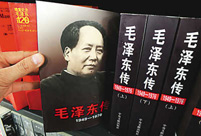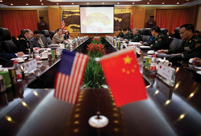 'Jin' named the word of the year by cross-strait netizens
'Jin' named the word of the year by cross-strait netizens Chinese scientific expedition goes to build new Antarctica station
Chinese scientific expedition goes to build new Antarctica station
 Chinese naval escort fleet conducts replenishment in Indian Ocean
Chinese naval escort fleet conducts replenishment in Indian Ocean 17th joint patrol of Mekong River to start
17th joint patrol of Mekong River to start China's moon rover, lander photograph each other
China's moon rover, lander photograph each other Teaming up against polluters
Teaming up against polluters
BEIJING, Jan. 2 -- In a drive that first targeted officials, then university presidents, and now lawmakers, China's fierce battle against corruption is hitting deeper and affecting more people.
It no longer comes as a surprise when the Central Commission for Discipline Inspection (CCDI) opens an investigation into a high-profile official.
Last month, at least five officials at the ministerial or vice-ministerial level were brought down by the CCDI, including Li Dongsheng, former vice minister of public security and Li Chongxi, former top political advisor in southwest China's Sichuan Province.
In fact, updates on graft investigations have become routine, if not daily, on the CCDI website.
However, Party and government officials are not the only targets of the anti-corruption campaign. The country is trying to squeeze corruption out of various sectors.
Shocking election fraud was exposed in late December in central China's Hunan Province, in which 56 lawmakers from Hunan's Hengyang City bribed 518 fellow lawmakers and another 68 staff in order to be elected to the Hunan Provincial People's Congress. The total amount of money involved exceeded 110 million yuan (18.14 million U.S. dollars).
The bribers were disqualified and those who took the bribes resigned.
This was considered a major move to show the resolve to fight corruption in the country's fundamental political system, the people's congress system.
Educational institutions have been another target.
An Xiaoyu, vice president of Sichuan University in southwest China, was investigated by the CCDI for suspected serious discipline violations.
An's investigation came after the case of Cai Rongsheng, director of the admissions office of Beijing-based Renmin University of China, who is also confirmed to have been investigated.
China's anti-graft campaign started from the self-reflection of the ruling Communist Party of China (CPC).
Calling corruption a serious threat to the Party's survival, President Xi Jinping has vowed to fight corruption and harmful work styles and called on the entire Party to stay on full alert since he took the helm of the CPC in November 2012.
Xi has called for a crackdown on "tigers" and "flies," referring to corrupt officials of both high and low rank.
Ideologically, the CPC started a campaign to promote the "mass line" and advocate against four forms of undesirable work styles: formalism, bureaucratism, hedonism and extravagance.
In everyday life, the CPC has issued a series of detailed instructions. The latest instruct officials to hold simple and inexpensive funerals and "take the lead" to follow smoking bans in public spaces.
In order to have a long-term effect, the CPC announced a five-year (2013-2017) plan to show its resolve to firmly fight corruption and maintain its "high-handed posture."
Courts and prosecutors are also asked to supervise officials through more independent and lawful investigation and rulings.
The Party's efforts are not limited to within the political system. Its main aim is to keep the whole society from being "corrupted." Only then will people feel real change.
 Commemorate 120th birth anniversary of Mao Zedong
Commemorate 120th birth anniversary of Mao Zedong Female soldiers of PLA Marine Corps in training
Female soldiers of PLA Marine Corps in training Chinese cities to have a very grey Christmas as smog persists
Chinese cities to have a very grey Christmas as smog persists China and U.S. - the national image in each other’s eyes
China and U.S. - the national image in each other’s eyes The Liaoning's combat capability tested in sea trial
The Liaoning's combat capability tested in sea trial Chinese pole dancing team show their moves in snow
Chinese pole dancing team show their moves in snow Rime scenery in Mount Huangshan
Rime scenery in Mount Huangshan Ronnie O'Sullivan: My children mean the world to me
Ronnie O'Sullivan: My children mean the world to me Shopping in Hong Kong: a different picture
Shopping in Hong Kong: a different picture Yearender: Animals' life in 2013
Yearender: Animals' life in 2013 Hello 2014 - Chinese greet the New Year
Hello 2014 - Chinese greet the New Year Chocolate 'Terracotta Warriors' appear
Chocolate 'Terracotta Warriors' appear  Top 10 domestic news of 2013
Top 10 domestic news of 2013 Red crabs begin annual migrations in Australia
Red crabs begin annual migrations in Australia Artifacts retrieved from West Zhou Dynasty
Artifacts retrieved from West Zhou DynastyDay|Week|Month